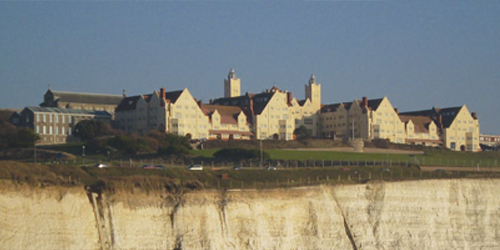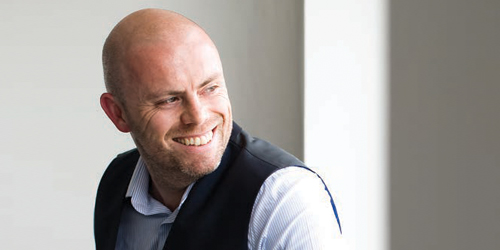
Oliver Blond has been at Roedean’s helm for nearly three years, and he is definitely steering it in exciting new directions. “It is certainly a challenge, a big challenge. When I arrived at Roedean and thought about what it stood for in terms of its history and legacy and where it could be in terms of the future, I was very excited. It has such a strong position in the sector, but I felt that it could be steered in a slightly new direction, focussing on providing a high-quality academic and all-round education to a very astute UK market. So I found this shift an intriguing prospect.”
The school was founded in 1885 by three sisters, and they had very clear aims for the school, centering on providing girls with an education which was equally as good, if not better, than that available for boys. The school was extremely successful from the outset and grew rapidly, to the point where it had to move, and the school on its present site was opened in 1898. The school is still growing today, and the reason is the renewed emphasis on localism.
“The interesting thing about the school is how it is growing, as this means we are capturing people’s attention. We are growing at about 15% a year in terms of pupil numbers, moving from 370 pupils to almost 500 pupils in three years, and that’s fantastic. The big growth area is in day pupils from across Sussex and London and South East weekly boarders, which is very exciting.
“I’m a strong believer in localism, and because there’s so much strength, talent and quality in Sussex and in our staff , everyone is invested. The school employs 250 local people and educates mainly local children, and this helps to harness the strength and the engagement of local parents as well.
“When I arrived, the question was, ‘How do we re-engage the local families?’ The answer is quite simple: if you align yourself to what parents and families want, which is happy and engaged children who will flourish and succeed, whatever their particular talents and interests, that happens very quickly.
“At every single Open Day, I talk to parents about how Roedean is a really important part of Sussex, with the view over the sea and the Downs behind. This is a Sussex school, so I want it to be here for Sussex children. I also want students, if they come from further afield or abroad, to experience Sussex, and a British education. A large feature of my last two years has been engaging with local UK families and schools to explain what our vision and heritage is all about, which is giving girls an exceptional, holistic education, the passion and determination to succeed, and arming them with the skills to make a difference in the world. Internationalism is fantastic, as we are all members of a global community, and we value it highly, but for the benefit of all students we need a strong base in the local community.
“One of the most successful things we’ve done recently is to extend our Brighthelm Awards to the Sixth Form, providing access for able students from local schools. It is vital that private schools do all they can to widen access and opportunity within the area.”
One perception of Roedean was that there were so many overseas students that it had effectively become an International School. Was this an accurate viewpoint?
“Roedean’s approach has shifted, and our intake in the last three years has meant our first three year-groups are now 90% UK pupils. However, we are still a global school in our outlook, and it’s genuinely important for a school in Sussex to have a diversity of pupils from different backgrounds and countries, as this enriches our community. We do live in an increasingly globalised world, and the understanding and empathy the girls develop through living in a school with girls from over 25 countries is very important. But we are a British school, and our international pupils value this aspect of Roedean as much as local pupils do.”
“There can be no doubt that Roedean is a unique school, due to the quality of the education and pastoral care, the strength of our heritage, the amazing location, with over 100 acres of the South Downs, overlooking the English Channel, and the individual talents of our girls. I think the most tangible part of Roedean, once you get inside the impressive façade, is the happiness of the girls, the sense of energy and excitement in the classrooms and corridors and the fact that it is a very welcoming, kind and friendly school. It is a very communal and community-focussed school, which keeps the academic standards high and ensures that the girls are really well-rounded individuals.
“Whether they board or not, Roedean is the girls’ home. You treat your home as something you really value, and this is the girls’ home for a significant proportion of their time. But they value the partnerships with other local schools and organisations and realise that they are in a privileged position and need to work proactively beyond the boundaries of the school with local people and organisations. It is this that helps them to grow personally and to develop skills, and which will be valuable in later life.”
Mr Blond feels that the key to the girls’ development is giving them the opportunity to grow up at their own pace, not being constrained by finite expectations, having the freedom to explore different possibilities, intellectual passions and to find their strengths. He believes that it is vital to give every girl the belief that she can excel, and that the self-confidence she derives from this will help her to challenge herself and realise her potential. The result is that the school has leapt 67 places up the league tables last academic year, with large numbers of girls achieving excellent grades in public examinations and going on to top universities.
When Mr Blond’s predecessor left the school, one of the reasons she cited was the hostile climate towards the independent sector in this country. Was she right?
“In my view, far from it. People are very positive about independent schools. One area where there is constant discussion is how much independent and state schools can work together and what they can do for each other. There’s been fantastic growth in the development of partnerships. We are currently working with City Academy, Whitehawk and Ringmer Community Academy, and we’ve got a few more in the pipeline.”
“I think the children benefit from seeing each other’s aspirations and sharing ideas. The girls here instinctively believe they’re going to go to university, but this isn’t a belief that all children have for themselves at primary school age, so it’s good to see them discussing their futures with other children. Our understanding of what we can achieve can develop very early in life, so these discussions are invaluable. We have girls really enjoying getting involved in reading programmes with younger pupils, as well as sports leadership, drama and music. The children have access to girls who can help generate an interest in learning.”
“Our partnership with Ringmer includes a series of strands drawing on the particular strengths of each school for our mutual benefit. Ringmer is very strong on ecology and sustainability, and they’re helping us set up a school farm and become more sustainable. We’ve got expertise in university admissions, so it’s very much a two-way partnership.”
“In the sixth form, all students go into Brighton every week to do what we call Community Action. They work with over fifty organisations across the City and they are engaging with hospitals, charities and non-profit businesses, which encourages sharing and understanding.”
Late last year, the Daily Mail reported on fears from a member of the Old Roedeanians’ Association committee, who believed the country’s most famous girls’ school was planning to allow boys into the imposing seaside towers. Meanwhile, just down the road at Brighton College, the Head, Richard Cairns, claimed that preventing the mixing of the sexes just doesn’t prepare people for the outside world. “Single-sex schools are a deeply unrealistic world”, declared Mr Cairns. So can it be true?
If there is anyone who knows the value of all-girl schools, it is Mr Blond, who has spent all of his educational career teaching or leading at girls’ schools. He initially worked in a girls’ grammar school, where he found the atmosphere incredibly empowering and enabling.
“There was much less focus on external rules and assessment regimes than in some boys’ or co-ed schools, perhaps because girls are so internally self-motivated and conscientious. This means that the focus was on developing a passion for subjects. Girls’ all-round development is not so well-served by too much scaffolding in the form of assessments and excessive focus on grades, but they respond very well to inspiration, opportunity, creativity and encouragement. It was this experience and insight that made me want to continue to work in girls’ schools.”
This eventually led Mr Blond to the highly regarded Henrietta Barnett School in North West London, where he was the Headteacher for almost eight years, leading the school to a top placement in the national league tables for six years and an award as the Sunday Times School of the Year before taking up the reins at Roedean.
“I think there is a place for both single-sex education and co-education, and there are pupils who will be more inclined to one type of schooling than the other. For every pupil who says they prefer co-educational, there will be another who prefers single sex education. Parents should be looking for the school that is best for their child, and that is a process that will involve a very careful and subtle consideration of many factors. I am not sure that parents are helped by listening to our pronouncements or a polarised debate. We should be trying to help pupils feel as positive as possible about the school they choose, whatever kind of school that happens to be.
“I know, however, from experience that girls benefit enormously, intellectually and in development of their self-confidence, from an approach to learning that prioritises their approaches and qualities and this is very much at the heart of girls’ school education.
“A 2006 study by Professor Alice Sullivan of the UCL Institute of Education found that single-sex schools did little to inhibit relationships between the sexes, and also that girls from single-sex schools were more likely to choose male-dominated subjects such as Maths and Science than if they were in a co-ed environment. This is certainly the case at Roedean, where Maths is one of the most popular A-level subjects, and large numbers take Sciences.”
“While people will argue that one is better than the other, when parents visit a school, most of them will say the single-sex or co-ed issue doesn’t matter as much as what the school is going to do for their particular child.”
“What you need for the outside world is confidence, character, the ability to take risks, knowing what to do when things don’t work out, being able to work in teams, being willing to lead, being able to be successful in a variety of fields, being able to speak in public, and being able to get on with all kinds of people. That’s what Roedean does best.”






